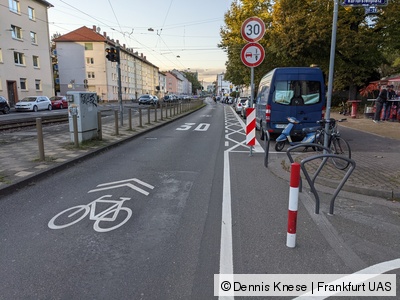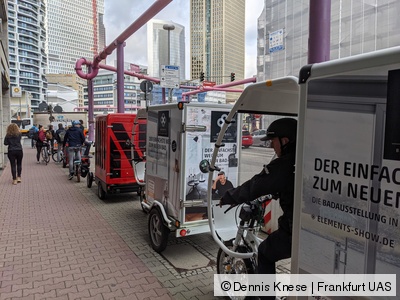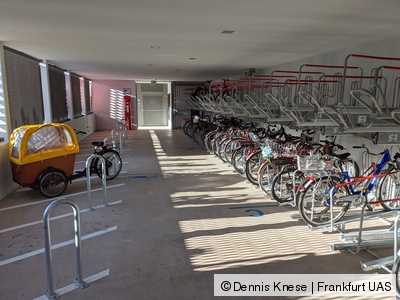In 2020, Frankfurt UAS was one of seven universities in Germany to receive an endowed professorship in cycling from the Federal Ministry of Digital Affairs and Transport (BMDV). While the topic was already part of teaching and research, Prof. Dennis Knese and the staff of the ReLUT - Research Lab for Urban Transport were able to expand and deepen the activities.
Study cycling
At Frankfurt UAS, cycling topics are taught in the engineering courses of the Department of Architecture, Civil Engineering, Geomatics (Fb1) as well as the economics and logistics-related courses of the Department of Economics and Law (Fb3). In the Bachelor's degree programmes, this is mostly done within the framework of existing modules that deal with various mobility, transport and logistics topics. This includes lectures and seminars, e.g. on the design of cycling facilities, as well as student projects in which students work in small groups on specific problems - also in the interdisciplinary Studium Generale.
Separate cycling modules are currently offered, for example, in the Bachelor's degree programme Infrastructure and Environment and in the Master's degree programmes Infrastructure - Water and Transport and Sustainable Mobility. The module "Intermodal Passenger Transport with Cycling" deals with the possibilities of linking cycling with other modes of transport. The students gain knowledge about the importance of inter- and multimodality in urban and suburban areas. Within the framework of a project work, they examine local connection facilities, bikesharing schemes or bicycle carriage in public transport, and develop their own concepts to improve the situation of intermodal transport.
The module "Cycling Logistics" is characterised by an interdisciplinary approach. The students acquire the managerial and logistical basics and learn to apply them to commercial transport using cargo bikes. In addition to legal, infrastructural and political factors influencing the competitiveness and market penetration of freight transport by bicycle, students learn about the technical requirements of cargo bikes and gain insights into the various market segments in which cycle logistics is used.
Practice- and research-oriented courses
The contents of the modules are deepened by expert contributions from practice as well as with excursions. Close cooperation with stakeholders from business, politics and administration ensures an application-oriented and course of study that focuses on hands-on challenges. In addition, students learn the basics of scientific work and working with guidelines, which they apply in exercises.
In addition, students can work on cycling topics as part of their Bachelor's and Master's theses and be involved in ReLUT research projects as student/scientific assistants.
Professional opportunities after graduation
With the acquired knowledge and the ability to act strategically in the field of transport and infrastructure planning, mobility management and logistics, graduates can function as cycling experts in the following fields of activity:
- Local, regional, national and international authorities
and institutions - Building and planning authorities
- Engineering and planning offices
- Consultancy and service companies in the mobility and
logistics sector - Mobility and transport associations
- Development cooperation organisations
- Research organisations
- and many more
Cycling in research
With its interdisciplinary orientation, the ReLUT is dedicated to various questions on cycling, which is of particular importance for achieving the mobility transition.
The focus is on familiar and new challenges in transport planning and road space design. For example, the market for bicycles and electric micro-vehicles has become highly differentiated in recent years, accompanied by new demands on infrastructure and legislation. On the other hand, various design elements have been introduced whose effect on mobility behaviour, road safety and quality of stay has not yet been sufficiently researched in many cases.
Infrastructure also plays an essential role for the integration of cycling with other modes of transport. In addition, however, various service aspects, such as the booking of transport services, the tariff and information must also be integrated. How means of transport can be linked efficiently and in a customer-friendly way, e.g. within the framework of Mobility-as-a-Service (MaaS) concepts, is therefore also the focus of research activities.
In the area of planning, there is also a great need for realistic parameters and data for modelling bicycle traffic. Here, ReLUT researches, among other things, the demands of different types of cyclists and the factors influencing mode and route selection. Overall, many projects involve data collection using various qualitative and quantitative methods. The importance of big data for transport science analyses is growing.
In addition to everyday mobility, tourism and leisure traffic in particular is an area with high potential for cycling. However, users have different demands on infrastructure and transport services. The ReLUT tries to identify the conflicts and synergies between everyday and leisure cycling in order to be able to develop holistic solutions to strengthen cycling in general.
Another dynamic field is cycle logistics, which can play a major role in the future for the rapidly growing commercial traffic. Here, ReLUT is working together with business partners on concepts and business models for emission-free delivery with cargo bikes, or as combined transport, e.g. using trams, electric vehicles and cargo bikes. The opportunities and challenges of microdepots in urban logistics networks are just as much in focus here as the feasibility of delivery by cargo bikes in rural areas.
Cycling Doctors
With the establishment of the cross-university and Germany's first PhD centre for mobility and logistics, academic staff have the opportunity to do a PhD at Frankfurt UAS and to address detailed issues relating to cycling and other mobility topics. The first PhD projects have already started and whet the appetite for more.
Current information and events
Regular scientific events are organised together with the other endowed professorships in cycling. We will keep you up to date on activities and events via the Instagram channel radverkehr_erfahren.
Contact
For further questions on study and research content, please contact Prof. Dr.-Ing. Dennis Knese.




